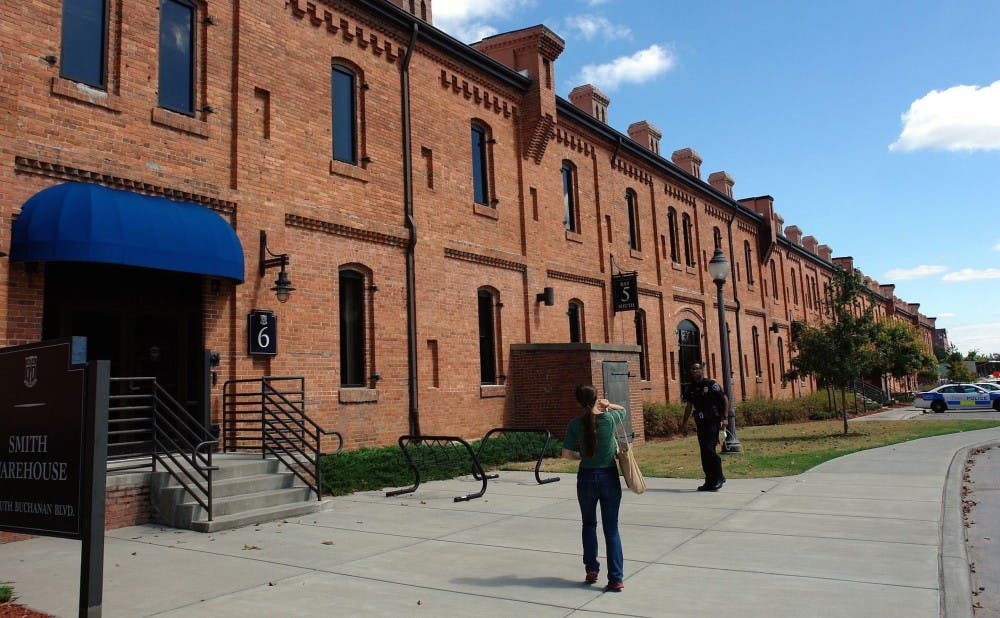Among the many flyers posted on the hundreds of bulletin boards around the university, one acronym that could be mistaken for a party is actually a lecture series in the humanities: the John Hope Franklin Humanities Institute’s “tgiFHI” series.
Playing on the popular expression “Thank God It’s Friday,” the events feature Duke faculty in the humanities, interpretative social sciences and arts that present a glimpse of their recent research. Since the beginning of the last semester, every week has seen a different panel, ranging from members of the departments of literature to the Duke Campus Farm. What sets the series apart from similar efforts, however, is the complimentary breakfast offered in the half hour leading up to the talk.
“I wanted to arrange regular faculty talks at a time when as many people as possible would have finished their classes for the week," wrote Ranjana Khanna, director of Franklin Humanities Institute, in an email. "Friday afternoon seemed like it wouldn’t draw people. But we have a good crowd in the Friday morning sessions, and that half an hour of breakfast time gives people a chance to relax and chat." Khanna is also a professor of English, Literature and Gender, Sexuality and Feminist Studies.
“It’s often the case that our own faculty members go and give presentations of their work at other universities, and we don’t hear about the work they are doing,” Khanna wrote, emphasizing the need for such events.
Last Friday, Duke professor Michaeline Crichlow and her colleague Patricia Northover from the University of the West Indies’ Sir Arthur Lewis Institute presented their recent work titled “Race, Space and the Kinopolitics of Place in Hispaniola: Notes on Primitive Accumulation.” Their Marxist analysis contended that there is an inherently racialized power relation deeply ingrained in the essence of capitalism. Theoretically, the two speakers relied on Karl Marx’s notion of “primitive accumulation,” as laid out in the first volume of “Capital,” as well as the relatively recent term of Kinopolitics, which the philosopher Thomas Nail coined to describe the political and social consequences of migration.
Although the talks are scholarly in nature, they are open to the public with no registration required. Many of them are uploaded to the FHI’s YouTube channel, such as this November talk by Literature professor Mark Hansen, “Techno-Aesthesis and Drone Vision.”
Commenting on its philosophical backdrop, Khanna explained that the series gives faculty members space to talk about their own work, “whatever the theme, whether disciplinary or interdisciplinary, contemporary or historical, obscure or topical.” The event series seeks not to complement any existing theme or priority; instead, its focus is on the university’s own scholars.
“FHI provides a space for work in the humanities that, for whatever reason, cannot happen within the confines of any one department,” Khanna wrote. Founded in 1999 by Professors Cathy N. Davidson and Karla F. C. Holloway, the Franklin Humanities Institute is dedicated to interdisciplinary research in the humanities and unites a myriad of related initiatives and events from its location in Smith Warehouse. The institute is home to labs, vertically integrated research projects arranged around a central theme, including “From Freedom to Slavery” or “Health Humanities.” Additionally, the FHI co-sponsors multiple degree programs, including the Ph.D. in computational media, arts & cultures and the human rights certificate. The institute is named after John Hope Franklin, a scholar of African-American history whose research and service on the NAACP Legal Defense Fund helped win the Brown v. Board of Education case, a landmark decision of the Civil Rights era.
In recent years, humanities departments around the country have encountered difficulties as enrollment numbers keep dropping in formerly common majors such as English, philosophy or history. Regarding this trend, Khanna said, “I hope that the projects we do encourage students at all levels of their careers to explore humanistic questions.” She added that employers are indeed interested in students who have a background in the humanities, for they possess “the creativity, the analytical skills, the writing skills” that are crucial in today’s work environments.
“Duke has extraordinarily brilliant faculty members in this area, and their work is varied, erudite, and sets a high standard,” Khanna said.
This Friday, music professor Jacqueline Waeber will present her research on Jean-Jacques Roussau’s famous writings about French and Italian music, which galvanized his contemporaries. Waeber sets out to advance a new interpretation, in which the distinction between the two countries’ traditions becomes a question of Nature versus Nurture. As always for tgiFHI talks, she will speak at 9:30 a.m. in the Ahmadieh Family Lecture Hall at Smith Warehouse, Bay 4, C105.
Get The Chronicle straight to your inbox
Signup for our weekly newsletter. Cancel at any time.

